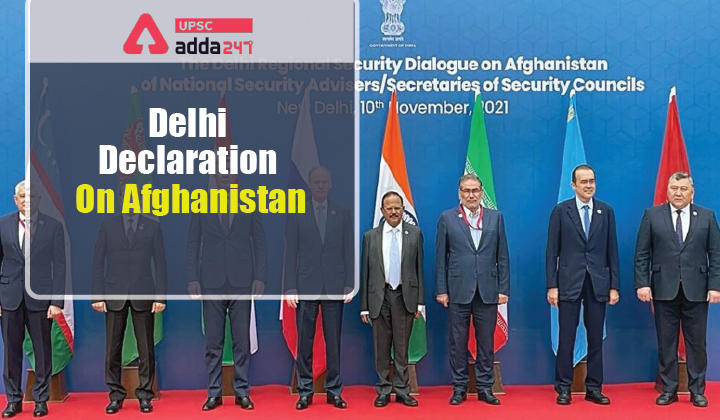Table of Contents
Delhi Declaration: Relevance
- GS 2: Bilateral, regional and global groupings and agreements involving India and/or affecting India’s interests.
Delhi Declaration: Context
- Recently,National Security Advisers of eight regional countries—India, Iran, Kazakhstan, Kyrgyzstan, Russia, Tajikistan, Turkmenistan and Uzbekistan— discussed the evolving situation in Afghanistan and have issued Delhi Declaration.
RBI’s New Retail Direct Scheme
Delhi Declaration: Key points
- Delhi declaration reflects the shared interest of the participants in not letting Afghanistan relapse into the terrorist hub that it had become when the Taliban ruled from 1996 to 2001.
- The sides paid special attention to the current political situation in Afghanistan and threats arising from terrorism, radicalisation and drug trafficking as well as the need for humanitarian assistance.
Crisis at Belarus-Poland Border
Delhi Declaration: Key takeaways
- The countries reiterated strong support for a peaceful, secure and stable Afghanistan while emphasizing the respect for sovereignty, unity and territorial integrity and non-interference in its internal affairs.
- The participating countries expressed deep concern over the suffering of the people of Afghanistan arising from the security situation in Afghanistan and condemned the terrorist attacks in Kunduz, Kandahar and Kabul.
- They emphasised that Afghanistan’s territory should not be used for sheltering, training, planning or financing any terrorist acts.
- They condemned in the strongest terms all terrorist activities and reaffirmed their firm commitment to combat terrorism in all its forms and manifestations, including its financing, the dismantling of terrorist infrastructure and countering radicalization, to ensure that Afghanistan would never become a safe haven for global terrorism.
- They called for a collective cooperation against the menace of radicalization, extremism, separatism and drug trafficking in the region.
- They stressed the necessity of forming an open and truly inclusive government that represents the will of all the people of Afghanistan and has representation from all sections of their society, including major ethno-political forces in the country. Inclusion of all sections of the society in the administrative and political structure is imperative for the successful national reconciliation process in the country.
- They recalled the relevant UN Resolutions on Afghanistan, and noted that the United Nations has a central role to play in Afghanistan and that its continued presence in the country must be preserved.
- They emphasized the importance of ensuring that the fundamental rights of women, children and minority communities are not violated.
- They also expressed concern over the deteriorating socio-economic and humanitarian situation in Afghanistan, and underlined the need to provide urgent humanitarian assistance to the people of Afghanistan.
- They reiterated that humanitarian assistance should be provided in an unimpeded, direct and assured manner to Afghanistan and that the assistance is distributed within the country in a non-discriminatory manner across all sections of the Afghan society.




 TSPSC Group 1 Question Paper 2024, Downl...
TSPSC Group 1 Question Paper 2024, Downl...
 TSPSC Group 1 Answer key 2024 Out, Downl...
TSPSC Group 1 Answer key 2024 Out, Downl...
 UPSC Prelims 2024 Question Paper, Downlo...
UPSC Prelims 2024 Question Paper, Downlo...
